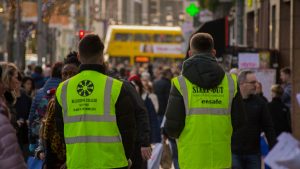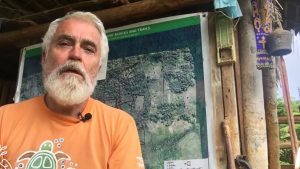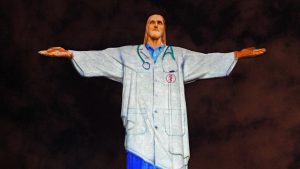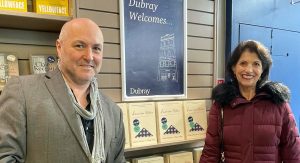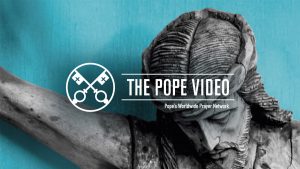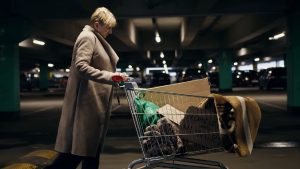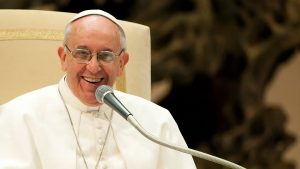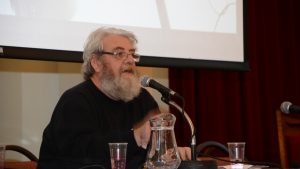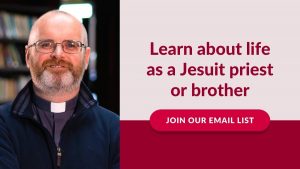African Immersion Experience III
 Michael Sheil SJ has just returned from Lesotho with a group of Clongowes boys, the third group to take on the African Immersion Experience since it started in 2007. This project is the brainchild of Australian Frank Clarke, Clongowes’ Director of Ethos. And ethos is central to the project. The motivation for the team springs from their faith; they go essentially as servants and students, to listen and learn and help. Belfast-born Michael Sheil, who has worked in Clongowes for years as man and boy, has always given time in the summer to pastoral projects such as handicapped children in Lourdes. It is clear from his African reflections that the Lesotho project hit him hard.
Michael Sheil SJ has just returned from Lesotho with a group of Clongowes boys, the third group to take on the African Immersion Experience since it started in 2007. This project is the brainchild of Australian Frank Clarke, Clongowes’ Director of Ethos. And ethos is central to the project. The motivation for the team springs from their faith; they go essentially as servants and students, to listen and learn and help. Belfast-born Michael Sheil, who has worked in Clongowes for years as man and boy, has always given time in the summer to pastoral projects such as handicapped children in Lourdes. It is clear from his African reflections that the Lesotho project hit him hard.
TAKING LIFE AS IT IS IN LESOTHO
Michael Shiel SJ
The tiny independent kingdom of Lesotho, known as The Mountain Kingdom, is situated about six hours’ drive due south of Johannesburg. Two years ago our Director of Ethos, Frank Clarke, inaugurated a project called An African Immersion Experience – where the emphasis is on getting to know and communicate with local people on the ground. His mantra was that we go to Lesotho as servants and students – i.e. we do not arrive with “our” already-made project, but find out what the people there would like us to do – and we try to adapt ourselves to their way of doing things.
While not primarily task-oriented, we did want to ensure that our stay was worthwhile for our hosts. As last year, we built a playground for a pre-school in the tiny and remote villege of Malealea, and helped construct part of a road to enable lorries to bring much-needed material for building a new school in an even more remote valley of this beautiful country.
The trip was prepared before departure by a series of meetings to reflect on the Faith-basis of what we were about to do. During our stay in Lesotho itself there were daily meetings to reflect in Faith mode and assess how things were going.
The local Committee of Malealea met us and helped put our work into context for the people of the villages. We were also received by the villagers themselves for an evening-night stay, which proved a remarkable experience for everyone. The welcome by each Family was incredibly moving and we were made to realize the honour that the people felt we were paying them by sharing in their ordinary family-life.
Another major highlight was Sunday Mass in the local [50kms away] church, when the Palm was blessed in the local football field in the presence of about 1,000 people, some of whom had walked for from two to three hours to get to Mass. The whole liturgy lasted all of two-and-a-half hours of celebration in song and dancing, as well as worship, with the usually-staid “Irish congregation” infected by the enthusiasm and energy of the congregation and joining in much to the delight of our host-parishoners. At the end of Mass the Clongowes “choir” (i.e. everybody!) we gave the now traditional rendering of Ag Chriost an Siol and It’s you who build community, to sustained applause from the whole congregation.
For the last two days of our stay we were billetted in the capital, Maseru, where we received wonderful hospitality from the Irish Ambassador, Paddy Fay and his Wife, Dee. However, the highlight of our visit to Maseru was undoubtedly the time spent in an orphanage for Double Aids victims (i.e. where both parents have died of Aids). It is run in incredibly impoverished conditions (unimagined by any of us before we actually experienced them) by a former policeman, Ntate Vincent, who gave up his career to carry on the work of his dying Wife (cancer) to look after street orphans – over 30 of them – in three crowded shacks on the banks of the river and beside the city dump and sewage outlet.
We felt that we had met a living saint in Vincent – and one could not but be amazed to witness the extraordinary happiness of those who have so little of this world’s goods but who can smile in the face of adversity because they have the best gift of all – the love of Vincent and their own companionship. Since last year, Habitat for Humanity has built two small houses for the orphans and, on our last free day, we decided to forego sightseeing tourism to paint the interior for our new-found friends..
While in Lesotho we were delighted to meet up with a Clongownian from last year, Ronan McCoy, who was so moved by his Immersion Experience two years ago that he decided to spend his Gap-year teaching in a school and the orphanage. Some of last year’s group have similar projects to go back to this lovely country and their marvellous people.
Having been fortunate to be on the trip on both the last two years, may I suggest that the perhaps the best assessment of the success of the African Immersion Experience can be conveyed by the following extracts from some of the reflections of the 2008 participants [for we have not yet had our post-trip reflection gathering for this year]:
I felt connected and involved with the world. I always felt I wanted to do something on the cutting edge. This made me feel alive. I really felt that I was doing something that made a difference to people. I felt that I was involved in something much bigger than myself. It was a special opportunity and I was lucky to get it. It was more about giving of yourself without thinking of yourself …… there was no “what do I get out of it” – it just wasn’t an issue.
In Lesotho we met the happiest people in the world – wealthy beyond our wildest dreams, although not materially, for on the outside they had nothing, yet on the inside they were the most spiritually rich people we had ever met. Their way of life has influenced me to depend on different things, friendship, love and family rather than on the materialistic things I was used to ………I hope that my experience in Lesotho will help me in the future in choosing the right path to take in life.
I had an unbelievable time in Lesotho. I found the people there incredible. They enjoyed life for what it is and not what they would like it to be. They taught me to appreciate the smaller things in life. I just feel that I have learned so much from the people of Lesotho. Maybe without realizing it I have changed as a person already because of my experiences.
Following on them, we, too, planted a seed – we hope that others will follow suit and, in making the world a better place, will be similarly enriched themselves.


